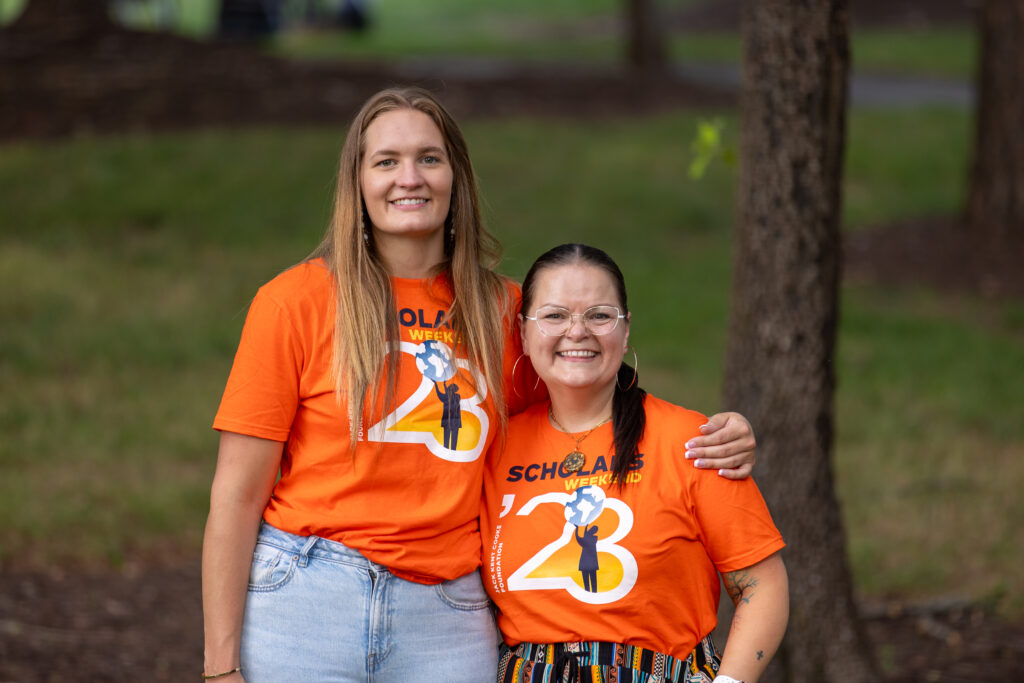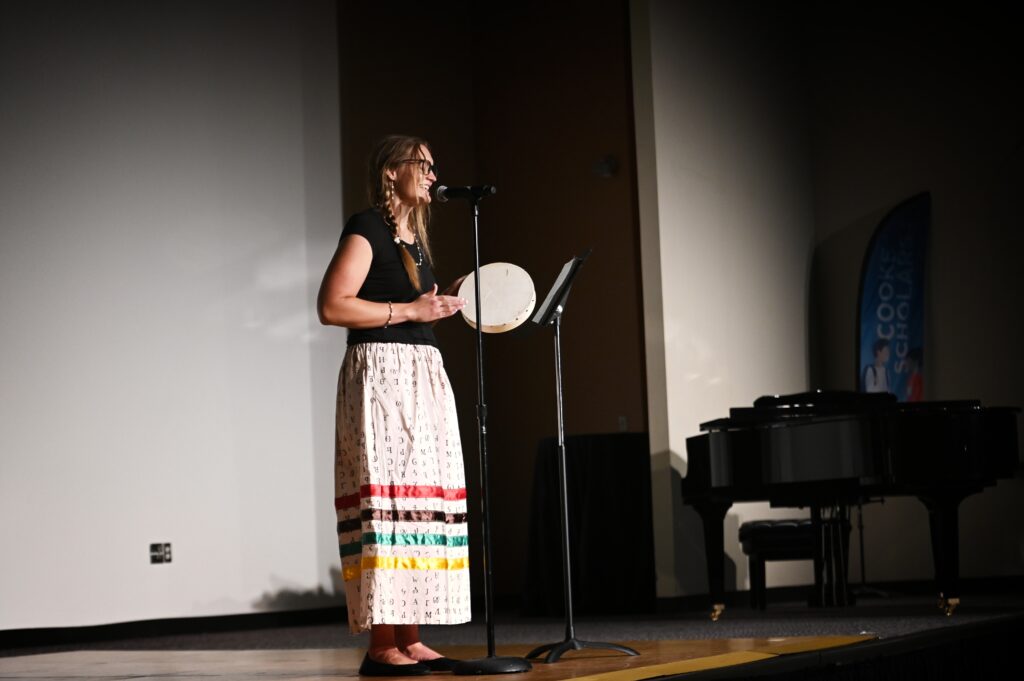Roots: Growing Up in Cherokee Nation

Kelly Parsley (left), a 2023 Cooke Undergraduate Transfer Scholar, poses with a new friend from her cohort at the Foundation’s annual Scholars Weekend conference.
November is Native American Heritage Month, where we celebrate the culture and accomplishments of the United States’ Indigenous peoples. In 1986, President Reagan declared the last week of November as “American Indian Week,” and the celebration has since evolved into a month-long dedication to learning about the richness of Native American history.
This year, in honor of Native American Heritage Month, we celebrate the remarkable accomplishments of 2023 Cooke Transfer Scholar, Kelly Parsley, a member of Cherokee Nation who currently attends University of Tulsa.
Growing up, Kelly Parsley had a secret dream of becoming a doctor. She was afraid to speak this dream out loud, however, as her upbringing in the Cherokee jurisdiction of Oklahoma made this goal seem unlikely. Her mother, who attended school only through 6th grade, could not read or write and no one else in her family had ever attended college. Her family heavily relied on assistance from the Cherokee Nation to survive, and education was not a priority.
The Cherokee Nation offers many more support services for low-income families now than it did when Kelly was growing up. But one service she remembers her family using was free school supplies from the Johnson-O’Malley program.
“Nothing had glitter on it, there were no cute puppy dogs on the folders,” Kelly says. “Everything was plain and cheap, and other kids knew where your school supplies came from.”
Because of the stigma surrounding the free support services her family depended on, Kelly remembers being embarrassed about her heritage at school. Her father, who was never a part of her life, is white, so she also felt out of place in Cherokee Nation because her lighter hair and eyes made her stand out.
“I grew up in an environment that was heavily native, but I don’t look native,” Kelly says. “I didn’t always know where I belong.”
Now that she’s an adult raising kids of her own, Kelly is grateful for the services that kept her family alive during those years. And she’s fiercely proud of her Native American heritage. The Cherokee Nation now offers many more programs for kids and families to embrace their culture. They have people who go into the community to teach others how to play traditional games like stick ball and marbles, or skills like basket weaving and beadwork.
Reconnecting to Her Roots
At 18, Kelly got married and immediately welcomed her first child. Her husband was not supportive of her educational aspirations and was against the idea of her enrolling in college. In their nine years of marriage, the two had five children who are now ages three through 11. Kelly left the marriage three years ago and has been raising her five kids as a single mom ever since.
After her divorce, Kelly needed a support system to rely on, so she moved back to the Cherokee Nation.
“I saw this side to my heritage that I never saw as a kid,” she says.
Soon, the lack of pride she felt toward being Native American turned into a passion for her culture. She and her kids started meeting members of the community who were ambitious and educated. They began learning to speak Cherokee together as a family, and attending cultural events in Cherokee Nation.
“After I was officially divorced, I started my first college class. It was the first thing I did,” said Kelly.
She attended Tulsa Community College for two years before receiving the Cooke Transfer Scholarship and transferring to University of Tulsa.
The family of six lives in a three-bedroom apartment on University of Tulsa’s campus, and has been enjoying the campus lifestyle of constant public events and academia. It is important to Kelly that her children are raised in a household where education is a priority, and living on campus is the perfect environment to foster that expectation.

Kelly performs at the Scholars Weekend 2023 talent show. She sang an original song she created to learn the Cherokee language syllabary.
Dreams For the Future
One day, Kelly picked up the Cherokee Phoenix newspaper and saw that a medical school had been built right in the middle of Cherokee Nation. It said “Oklahoma needs doctors like you.”
“I’ll never forget that day,” Kelly says. “I still have that newspaper hanging on my wall. It gave me this fire inside me.”
That fire still burns as Kelly pursues her childhood dream of becoming a doctor at University of Tulsa. She loves the idea of one day attending that medical school, Oklahoma State University – College of Osteopathic Medicine but is open to other medical schools as well. She believes that having more doctors from diverse socioeconomic backgrounds results in better healthcare overall.
“It’s because you’re talking to someone as an equal,” said Kelly. “They’re going to listen to you and do what’s best for themselves.”
On top of her biology coursework, Kelly managed to fit in a college-level Cherokee language course at University of Tulsa, which is being offered for the first time in 30 years. She speaks to her children in Cherokee as much as possible at home so they can all learn and connect to their roots together.
Learn more about Native American Heritage Month from the official website here.